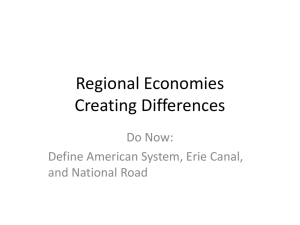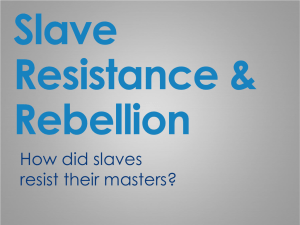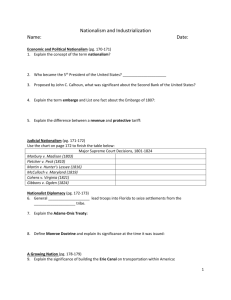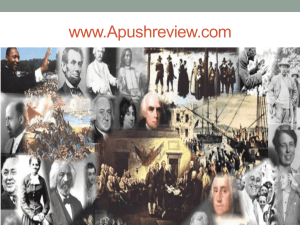Ch 9-13 Test Prep
advertisement
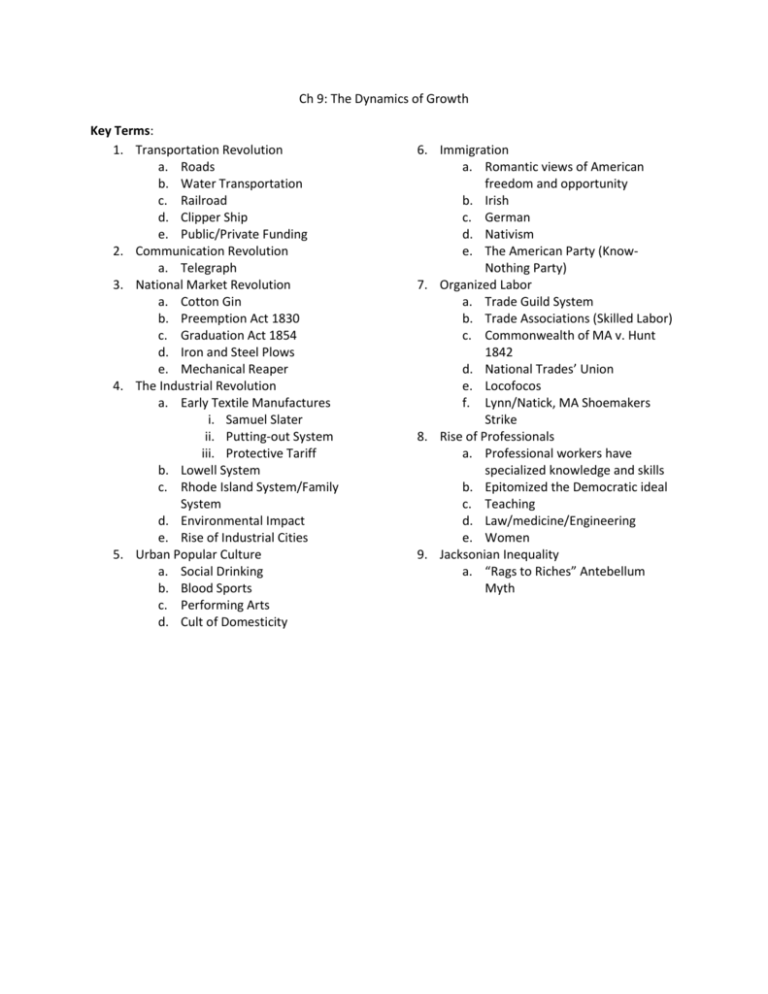
Ch 9: The Dynamics of Growth Key Terms: 1. Transportation Revolution a. Roads b. Water Transportation c. Railroad d. Clipper Ship e. Public/Private Funding 2. Communication Revolution a. Telegraph 3. National Market Revolution a. Cotton Gin b. Preemption Act 1830 c. Graduation Act 1854 d. Iron and Steel Plows e. Mechanical Reaper 4. The Industrial Revolution a. Early Textile Manufactures i. Samuel Slater ii. Putting-out System iii. Protective Tariff b. Lowell System c. Rhode Island System/Family System d. Environmental Impact e. Rise of Industrial Cities 5. Urban Popular Culture a. Social Drinking b. Blood Sports c. Performing Arts d. Cult of Domesticity 6. Immigration a. Romantic views of American freedom and opportunity b. Irish c. German d. Nativism e. The American Party (KnowNothing Party) 7. Organized Labor a. Trade Guild System b. Trade Associations (Skilled Labor) c. Commonwealth of MA v. Hunt 1842 d. National Trades’ Union e. Locofocos f. Lynn/Natick, MA Shoemakers Strike 8. Rise of Professionals a. Professional workers have specialized knowledge and skills b. Epitomized the Democratic ideal c. Teaching d. Law/medicine/Engineering e. Women 9. Jacksonian Inequality a. “Rags to Riches” Antebellum Myth Ch 10: Nationalism and Sectionalism Key Terms: 1. Economic Nationalism a. Second Bank of the United States b. Tariff of 1816 c. National Road d. The “American System” e. Panic of 1819 2. Political Nationalism a. Era of “Good Feelings” 3. Geographical Nationalism a. The Convention of 1818 (Don’t Confuse with the Convention of 1800!) b. Transcontinental Treaty (Adams-Onis Treaty) 1819 c. Missouri Compromise 4. Judicial Nationalism a. Judicial Review b. Federal Power Supremacy c. Protection of Contract Rights d. Interstate Commerce Regulation 5. Nationalist Diplomacy a. Monroe Doctrine 6. End of One Party Politics a. “Corrupt Bargain” b. Patronage c. Democratic-Republican Party Division i. National Republicans ii. Democrats d. Election of 1828 e. Universal White Manhood Suffrage f. Mass Democracy Ch 11: The Jacksonian Era Key Terms: 1. 2. 3. 4. 5. 6. 7. 8. 9. 10. 11. 12. 13. 14. 15. 16. 17. 18. 19. 20. 21. 22. Spoils system National political conventions Peggy Eaton Affair Maysville Road Veto Tariff of 1828/”Tariff of Abominations” South Carolina Exposition and Protest Webster-Hayne Debate South Carolina Ordinance of Nullification Force Bill Compromise Tariff of 1833 Indian Removal Act 18305 Civilized Tribes Trail of Tears Cherokee Nation v. Georgia 1831 Worcester v. Georgia 1832 The Bank Recharter Veto Pet Banks Wildcat Banks Distribution Act Specie Circular Act Panic of 1837 Independent Treasury System 1840 “Log Cabin and Hard Cider” Presidential Campaign Chapter 12: Key Terms 1. 2. 3. 4. 5. 6. 7. 8. 9. 10. 11. Uncle Tom’s Cabin “peculiar institution” Master paternalism Return to Africa Colonization Haitian slave revolt influence on American slave system King Cotton Old South Social Hierarchy a. Planters b. Plantation Mistresses c. White Middle Class d. “Poor Whites” Code of Gentlemen Black Society a. Free Blacks i. Mulattoes b. Anti-slave Trade Act c. Rural Slavery d. Urban Slavery e. Slave Women f. Celia Story g. Slave Family h. Slave Community i. Spirituals j. Slave Religion and Folklore k. Slave Rebellions Abolitionist Methods and their Effectiveness Defense of Slavery Arguments Chapter 13 Reflection Rise of a Unique American Cultural Identity Key Terms 1. Rational Religion a. Calvinism b. Deism c. Unitarianism d. Universalism 2. Second Great Awakening 3. Transcendentalism 4. Romanticism 5. Transcendentalism a. Emerson b. Thoreau 6. Mormons 7. Hawthorne 8. Dickinson 9. Irving and Cooper 10. Poe 11. Melville 12. Whitman 13. Popular Press 14. Public and Higher Education 15. Popular Education 16. Temperance Movement 17. Prison/Asylum Reform 18. Women’s Suffrage Movement 19. Utopian Communities

